Star Date: May 2016
Turkey III- Central Anatolia – Rumi
Hello Dear Family & Friends!
“Tesekkur ederim.”
(Thank you. Turkish)
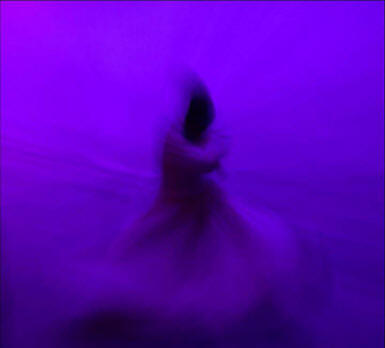
“Out beyond ideas of wrong doing
and right doing there is a field.
I’ll meet you there.”
(Mevlana jelaluddin Rumi – 13th century)
Vanished! Into thin air! Grief gives birth to life; sadness to joy. The sudden disappearance of the beloved teacher of Sufi mystic Rumi, plunged him into the depths of despair. One day in the mosque, almost fainting he grabbed a column and slowly walked around and around, counter clockwise. Slowly round and round. Words of poetry came pouring out of him. Remarkable, divine poetry. Breaking through the darkness into light, he radiated a luminescence from inside to out. He was suddenly living the Love and adoration of his God. Poems of Love and Praise emanated from Rumi. His students were overwhelmed with the sincerity and depth of his words. His love of his master and worldly people and objects was transformed to love for Allah or God. For living in this radiance transcends all worldly love. All is one. The shock of this glowing, circumambulating teacher gave way to praise and adoration of all those present. His students began writing down his words and it is these words of Love that inspire us to this day; 800 years later. Old age or new age?
Born in 1207, in a region of Persia, Rumi and his family were forced to flee the onslaught of Ghengis Khan. The Mongols were advancing behind the tiny fleeing caravan, spreading death and destruction in their path. Traveling for years first to Mecca then throughout the Middle East they finally were called to Konya, in central Anatolia Turkey, an important stop along the Silk Road. Currently peaceful, Konya was a crossroads of learning, cultures and religions; Islam, Judeo Christian, Hindu and Buddhist. There Rumi’s father became the head of a Sufi learning community and upon his death Rumi stepped into his place as teacher and healer in the mosque. As is often the case in life, Rumi was settling a little too comfortably into his existence, his human storyline. Life provided a shock, to jolt him along his spiritual path, when a wandering Syrian Sufi dervish and mystic, appeared in the streets of Konya. Shams al Din (Sun of Religion) of Tabriz, possessed an overwhelming personality and for months they were inseparable. Shams al Din revealed to Rumi or Jalal al-Din the mysteries of divine majesty and beauty. Infatuated with these teachings, Rumi neglected his disciples, teachings in the mosque, and family so that they forced Shams to leave the town in February 1246. Rumi’s eldest son travelled to Syria to retrieve Shams in an effort to pull his Father out of despair at the loss of his teacher and friend. Once back in Konya the two again became inseparable, caught up in the ecstasy of living closely, continually and completely in the Love called God.
Jealousy once again reared it’s ugly green head and one night in 1247 Shams disappeared, without a trace, forever. Rumi was heartbroken. In this land of intrigue, the truth of what really happened was unknown for centuries. It was proven in the 20th century that Shams was in fact murdered, and quickly buried next to a well in Konya; not without the knowledge of Rumi’s sons.
Suddenly separated from his teacher and dear friend, Rumi was devastated. From the depths of despair Rumi once again connected to the sunshine of his internal source, but now without the guidance of his friend and master, Shams. His students wrote the melodic words down as he walked. Over 800 years later, the wisdom of the Sufi mystic, Rumi, is being discovered in the west. In fact, Rumi is the best selling poet in America! Rumi is the true poet of the heart.
“A pilgrim visited a Sufi saint.
He was astonished to see that the Sufi’s home was a simple room.
The only furniture was a mat and a kerosene lamp.
Tourist : “Sufi, where’s your furniture?”
Sufi : “Where is yours?”
Tourist : “Mine? But I’m only a visitor here.”
Sufi : “So am I ! “(Rumi)
Rumi went on to compose over 30,000 lyrics of the heart; all of them filled with Love from inside his heart, shining radiant like the moon. The poetry indeed accomplishes the goal to force us out of our minds and into our hearts. Composed in a state of ecstasy, the poetry remained down to earth, often relating and describing this love apparent to all in Nature or simple everyday tasks such as the ‘singing’ of the tap, tap, tap of the goldsmith in the market. The whole world, to Rumi, was making a joyful noise or song unto the Lord. Rumi used to go with his disciples into Nature, often composing verses he heard vibrating or singing from the birds, trees, flowers around him. He was inspired by the music of flutes and drums and often would whirl and recite in a form of ecstasy.
Rumi always remained a respected member of Konya society, and his company was sought by the leading officials as well as by Christian monks. His burial procession was attended by a vast crowd of people of many faiths and nationalities. His mausoleum, the Green Dome, is today a museum in Konya; it is still a place of pilgrimage, primarily for Turkish Muslims.
“Respond to every call that excites your spirit” – (Rumi)
Responding to a call we headed towards Konya, birthplace and school of beloved Sufi master, Rumi. Also known as Mevlânâ, Rumi was a 13th-century Persian poet, jurist, Islamic scholar, theologian, and Sufi mystic. A fascinating complex, the mosque, school and museum echo the rich history of Rumi. We met a young man during our search for a hotel near the Mevlana museum. We spent most of the day and evening with him. A polite young man, he was fascinated to be in our company practicing his English and we benefitted from his knowledge of the back alleys of Konya.
A rare treat is the Mevlevi Sema Ceremony. Visiting on the day when it was being performed was not a coincidence – just the way our lives and travels open up. This ceremony, performed in the newly built cultural center, represents “the mystical journey of man’s spiritual ascent through the mind and love to perfection.” It takes you on a spiritual journey of dervishes whirling for Divine Love. This 800 year old tradition is stunning and inspiring, performed for Allah or God, not the audience. All of life is in constant motion. We are all constantly spinning or whirling. As beings living on a planet rotating, spinning, whirling through the galaxy, we are always in motion. The Sufi Whirling Dervishes believe that if we join in this force of life we become one with God. Joining in whirling meditation, taught by our new 84 year old friend in Osho’s Ashram in India, I experienced Rumi’s sweet ecstasy of connecting to our internal source, the One, God, Love, Infinite Consciousness. Lost in this Oneness, I was able to whirl for 20-30 minutes. Ecstacy! I long for this connection throughout the day, not just in my morning meditation. It was interesting to note that time disappeared when in the timeless blur of whirling, but as soon as one goes back into the thoughts of the mind you simply fall down, crashing back into the ‘real world’ of human existence.
The Sufi’s are an ancient mystical, spiritual order of Islam. According to many Sufi’s, the essential truths of Sufism exist in all religions. “Wonderful, sublime truths that pierce directly into the very hearts of everyone.” The Sufi’s would mingle with people of all religions and beliefs, sharing their joy; drawing people into the depths of the human well. Timeless wisdom.
“Close your eyes, fall in love, stay there.” (Rumi)
And so it goes…………………………………..Next the western coast of Turkey, completing our circuit back to Istanbul. Until then let’s remember to meet everyone in the field beyond ideas of wrongdoing and right doing. Too much time is wasted with ego and pointing out others faults. Focus on the good in others, remembering we are all one! Take care, Keep smiling and thanks for keeping in touch!
Love, Light & Laughter,
“xoxoox Nancy & Joseph
“Out beyond ideas of wrongdoing
and rightdoing there is a field.
I’ll meet you there.
When the soul lies down in that grass,
the world is too full to talk about.
Ideas, language, even the phrase “each other” doesn’t make any sense.
(Mevlana jelaluddin Rumi – 13th century)
Travel notes:
1 US Dollar equals 2.84 Turkish Lira
Konya:
Another enormous city. Otogar (bus station) is 14 km from city center. Walk to the side of the station (ask) and catch a mini bus to the city center (get someone to write it in Turkish) Get off and ask to go to the Mevlana – behind the Mosque and museum are many hotels 70-100TL
Konak Otel
Aziziye Mah, Ayanbey Sk 17 #0332 353 98 52 Room 301 2 windows great hotel for 80TL no breakfast
Free performance of Whirling Dervishes- Sat 7pm at the large impressive Cultural Center Arrive by 6:30 One mile lovely stroll from the Mevlana.
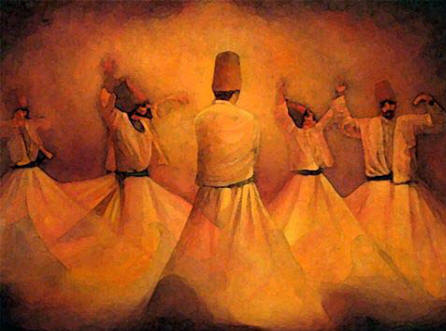
“I tried to find Him on the Christian cross, but He was not there;
I went to the temple of the Hindus and to the old pagodas,
but I could not find a trace of Him anywhere…
I searched on the mountains and in the valleys
but neither in the heights nor in the depths was I able to find Him.
I went to the Ka’bah in Mecca, but He was not there either…
I questioned the scholars and philosophers but He was beyond their understanding…
Then I looked into my heart and it was there
where He dwelled that I saw Him,
He was nowhere else to be found…” (Rumi)
“Silence is the language of God,
all else is poor translation.”
(Rumi)
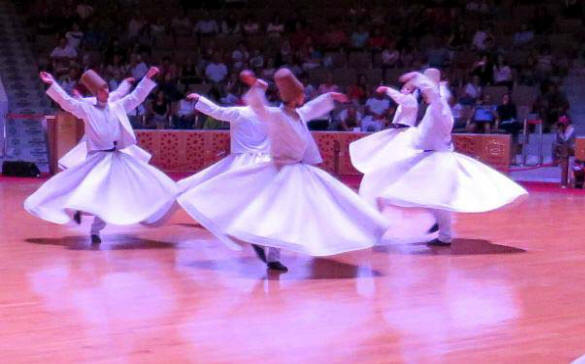
The Mevlevi Sema Ceremony. This 800 year old tradition is
stunning and inspiring, performed for Allah or God,
not the audience.
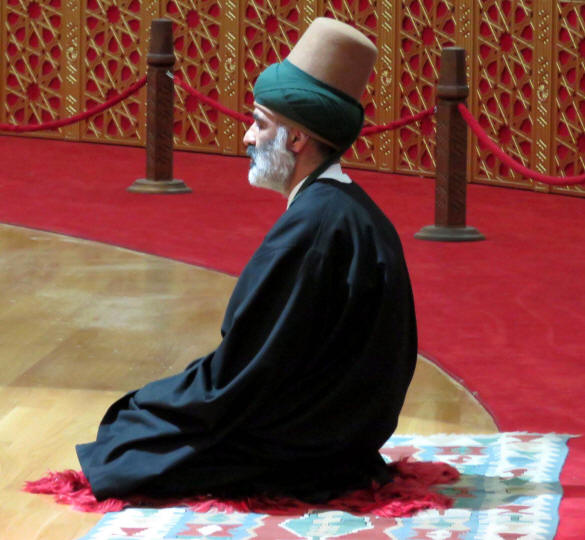
The leader begins by reciting from the Qu’ran.
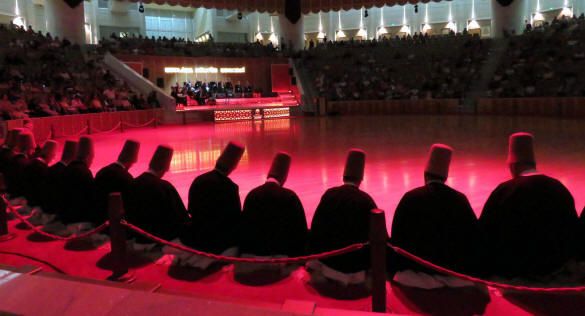
Preparing themselves for the whirling.

The Sufi Whirling Dervishes become one with God
through spinning.
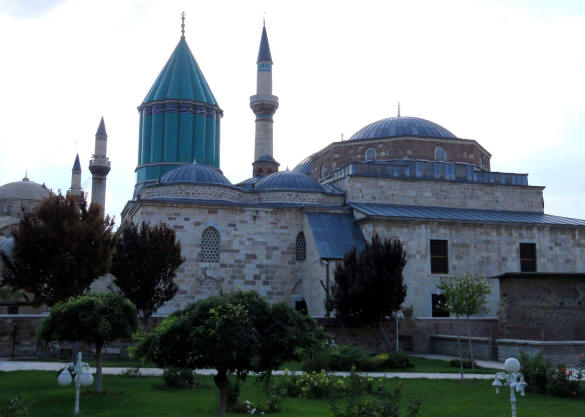
The Mevlana complex of mosques, Rumi’s school and a
wonderful museum showing life in the 1200’s.
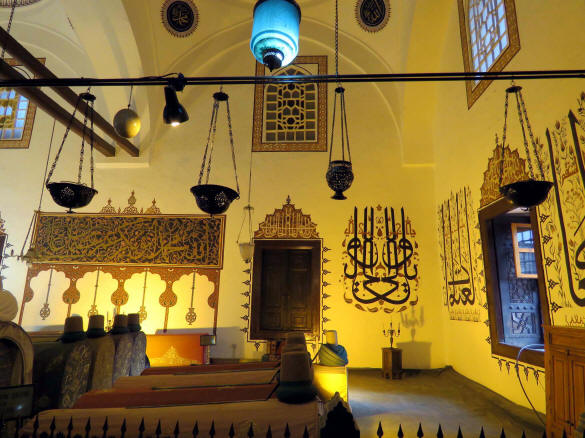
Rumi’s tomb.
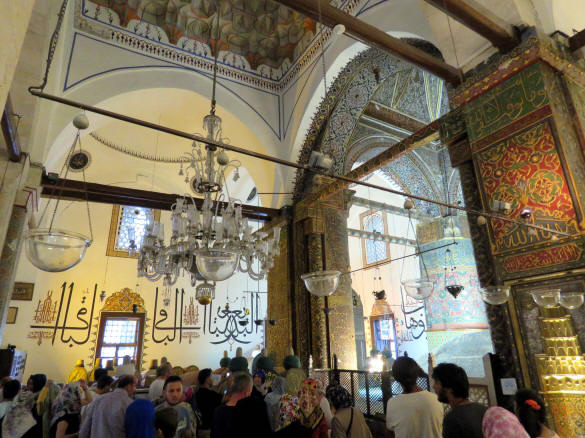
Intricately decorated mosque.

Ancient album of Ottoman Sultans.
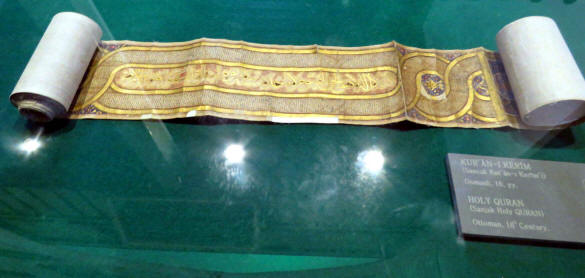
Hand painted scroll of the Qu’ran.

Mevlana’s (Rumi’s) cap case.
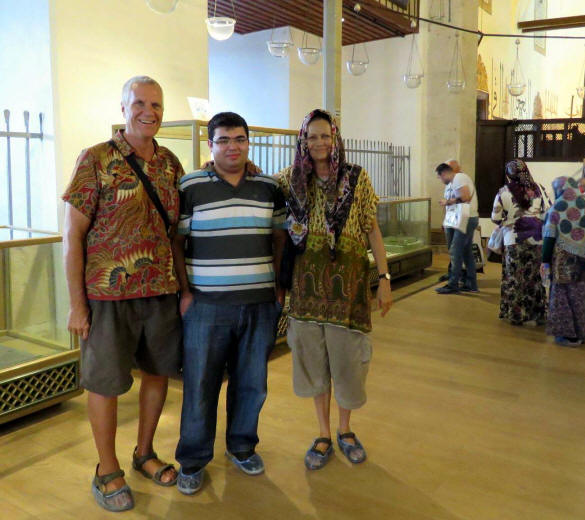
We spent the day with this polite young man. He was fascinated to be in our company practicing his English and we benefited from his knowledge of the back alleys of Konya.
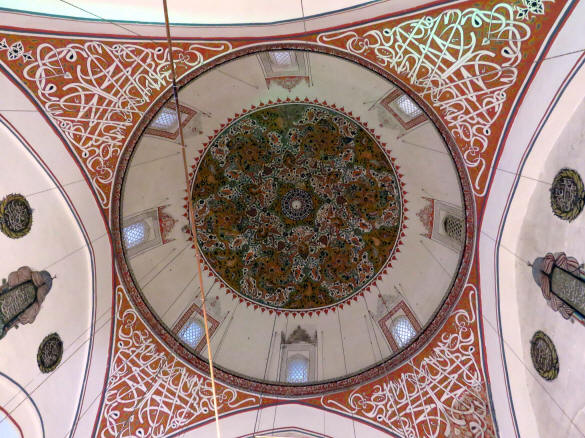
Stunning painted ceilings.

Brilliant turquoise tiles shining in the sun.
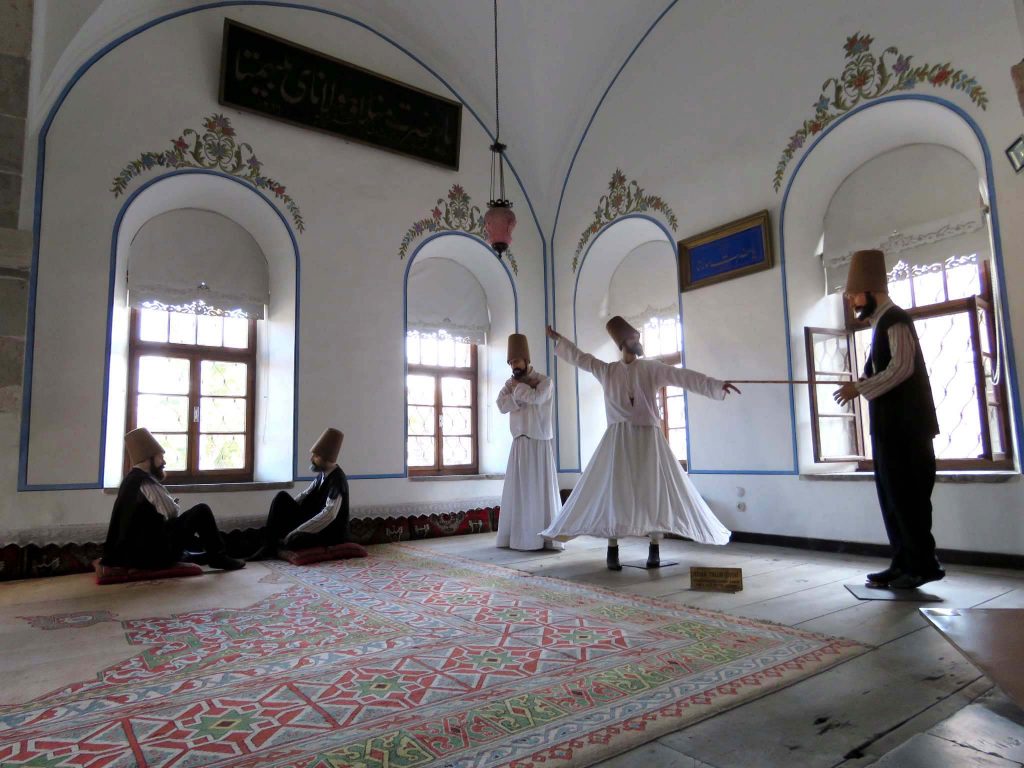
Instructing the devotees.
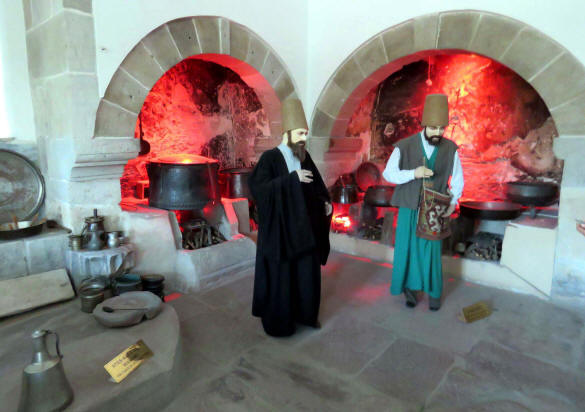
Preparing food for the students.
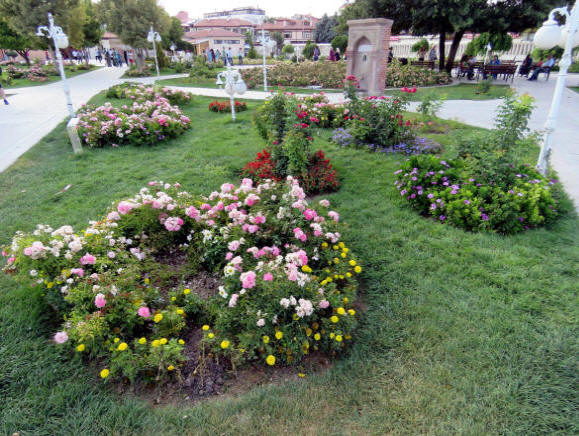
Beautiful gardens fill the grounds of the Mevlana.

Turkish pilgrims thrilled to finally be visiting Rumi’s school.
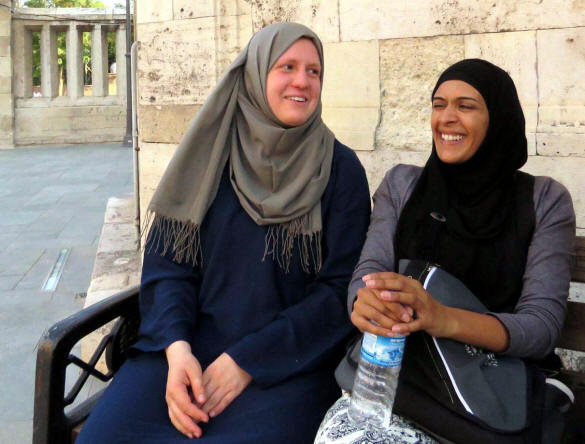
This woman converted to Islam in the U.K. and came to Konya
for a week long study group on the teachings of Rumi.
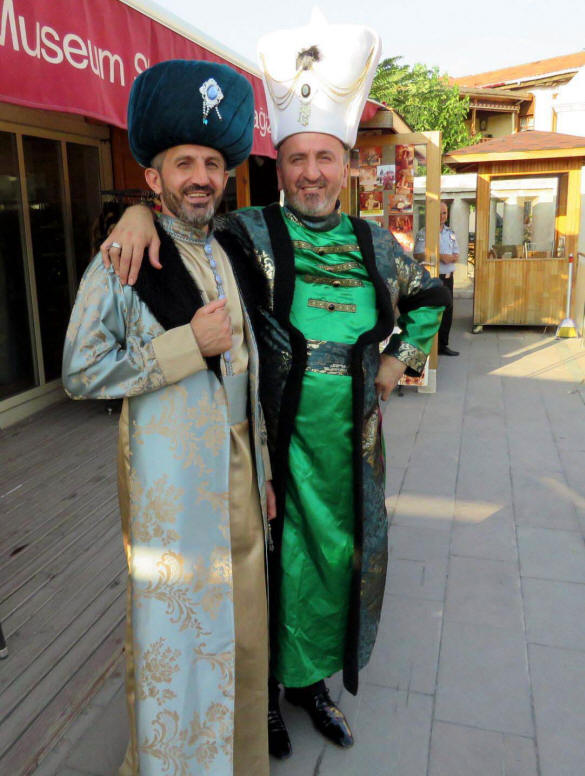
Having fun trying on costumes from the 1200’s.

A beautiful, yet fully covered, Turkish bride posing in the garden.
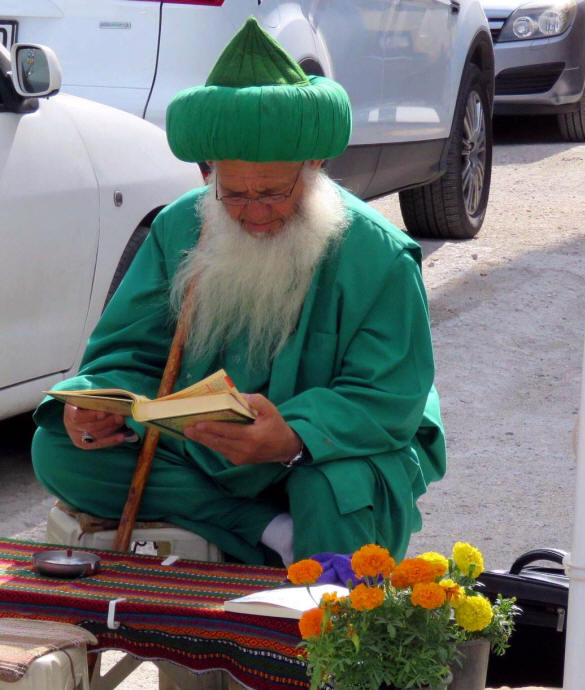
A fortune teller in a side alley of Konya.
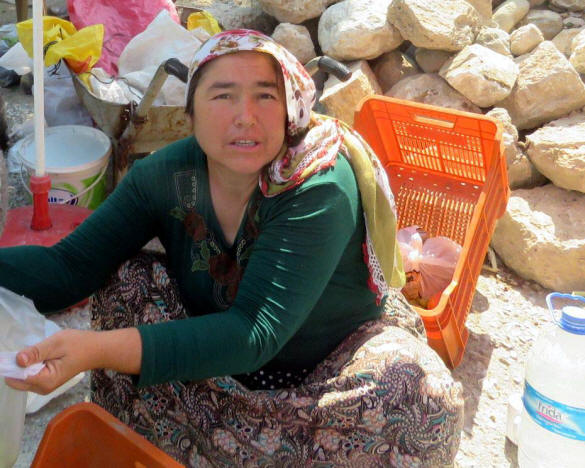
Selling grains in the market.

An old ‘bubba’ choosing melons for her breakfast.

Colorful windows in the mosque.
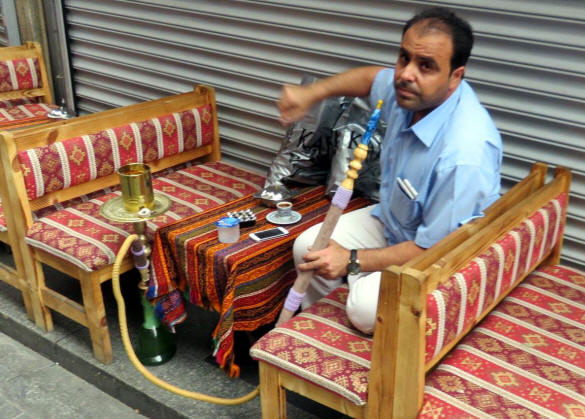
Smoking a sheesha or water pipe in a small sidewalk cafe.
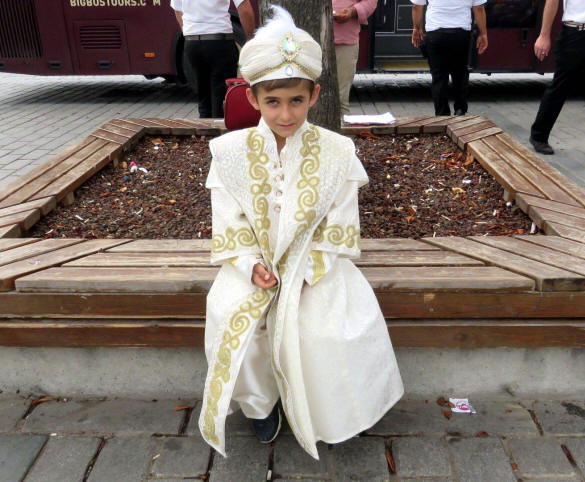
Dressed in a traditional costume.
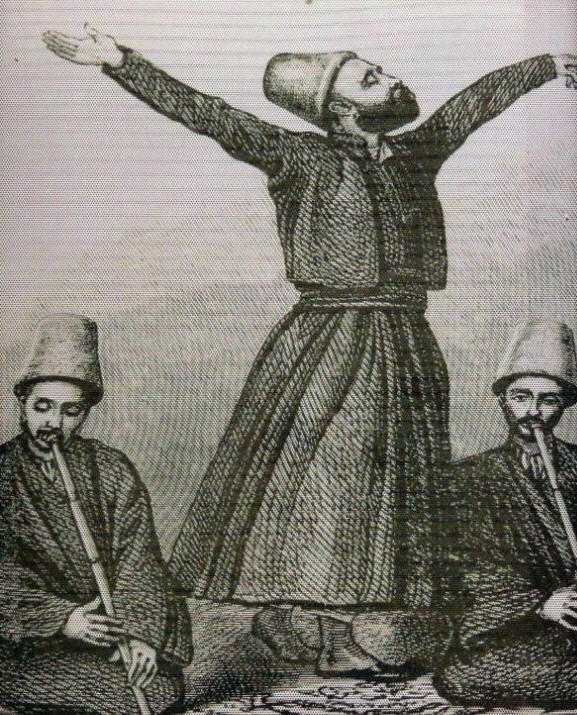
Print from the 1200’s of the dervishes and their flutes.
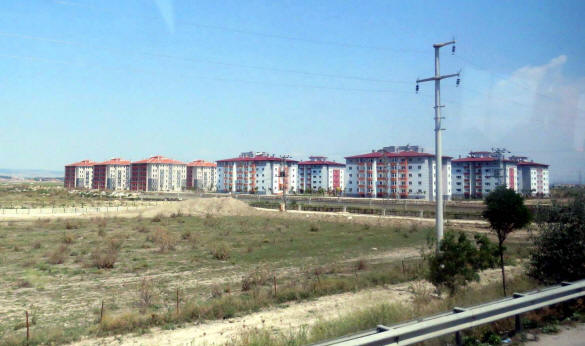
Overpopulation. We couldn’t believe our eyes as we left
the large new section of Konya. Miles and miles of high
rise complexes.
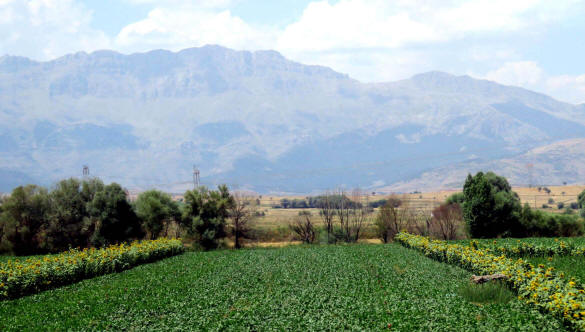
Anatolia is a beautiful region.
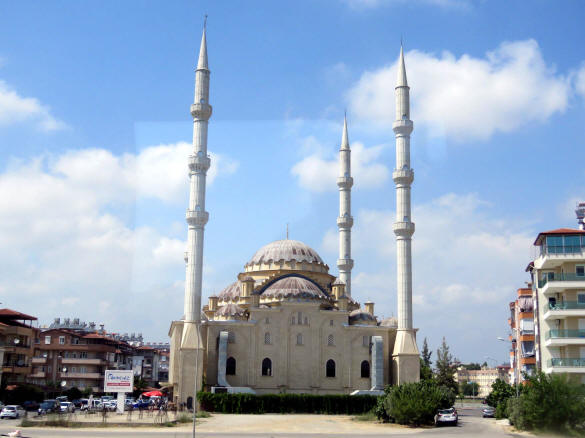
Mosques punctuate the skyline of every town in Turkey.

